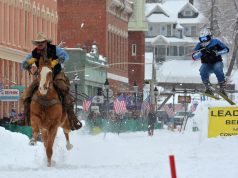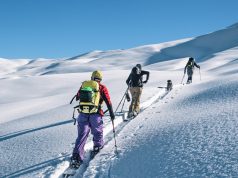
Two hundred miles. Two mountain passes. Twenty-four hours — from Friday, Aug. 6 to Saturday, Aug. 7 — on the move. More than 16,500 feet in total elevation gain. Thirty-six legs. Fort Collins as the start, Steamboat the finish line.
That’s the Wild West Relay race in a nutshell. Pain, suffering and blisters are guaranteed, new shoes after the race are optional. The pain is made easier by the fact that the Wild West is a relay. That means that you’ll get some sleep. You’ll be able to share your suffering with others. And you’ll have a teammate there to attend to the blisters when you finish one of your sections.
Runners talk about this race. Participants who’ve done it say things like, “the experience of a lifetime,” “unforgettable” and “loads of fun with loads of running.” They also talk about the pain, about teammates being “delirious and stumbling” in the middle of the night, and “brutal” sections of trail. They also talk about their teammates — the race has an ultra category with teams of six and a sport category with teams of six to 12 — the teammates who get them through the night and the hard times. The teammates who offer moral support and the teammates who cheer them on. After all, this is a relay, right? No one would be dumb enough to try to run the Wild West alone. Or would they?
Tony Stafford is the kind of guy you see often in Boulder: fit, tan, full of energy and radiating stoke. But it wasn’t always that way. Prior to moving to Boulder, Tony drank too much. He lived in Florida. He smoked cigarettes, and he dreamed of a career in law enforcement. It was that dream that proved to be a turning point.
Law enforcement guys in Florida don’t have to be marathon runners, but they do have to pass a fitness test. Part of that test is a two-mile run. One day Stafford decided to see if he had what it took to ace that part of the test. He took off running. At sea level and on the flats.
Running hard. Chasing his dreams. He only lasted a halfmile before he
cracked. Two miles was 1.5 miles too much. It was a wake-up call.
He
decided to train. He quit smoking. He got serious. He did his first 5K
in 2006. He decided to up the ante in 2007 and ran a marathon. The
running bug had bitten, bitten hard, and Stafford was hooked.
Stafford
isn’t just a runner. Sure, he’s graduated from that first marathon to
become a “pacer” — a guy who runs in front of folks who are trying to
get through their marathon and meet certain goals, like seven-minute
miles. He’s also one of the founders of Boulder Sports Performance
(BSP), an elite training organization. The company’s motto is “Making
you stronger, mentally tougher, and more agile,” and they deliver
results via customized programs that push both weekend warriors and
elite athletes to achieve performance results far beyond what they
themselves considered obtainable. BSP offers individual programs, as
well as group training sessions, and they coach clients in everything
from dietary needs to mental toughness.
The
latter is the key. Mental toughness, says Stafford, was the key to his
success at transforming himself from a cigarette-smoking boozer who
couldn’t even run a mile to a guy who paces other people in marathons.
And mental toughness is also, according to Stafford, the key to not only
achieving one’s goals as an athlete at any level, but also exceeding
them. But along with mental toughness comes a bit of swagger.
Hell, if you’ve gone from a fat guy in Florida to someone who regularly runs marathons, anything is possible, right?
Yup,
anything is possible. Including doing something so difficult and
committed that only one other person has ever done it before. Something
that even committed endurance racers look at with a sideways, “that guy
is crazy” glance. Something as foolhardy as tackling the Wild West Relay
solo.
“The guys
who do this view it as a personal challenge,” says Paul Vanderheiden,
race director for the Wild West. “It’s a remarkable feat. It’s very,
very difficult physically, mentally and emotionally.”
Vanderheiden
notes that because the Wild West is a relay, most of the runners have
support and motivation from their team members during the event.
“You’re running, but you’re running for your team,” says Vanderheiden.
“You run hard because your team depends upon you.”
But
for the solo guys it’s different. You’re alone, and you have to have
something else to tap into. Along with the mental toughness you need a
mission. And that’s exactly what Stafford has.
“What
led us to work with Tony was his sense of passion,” says Liz Toohey of
the American Lung Association. “We get approached by many people, but
this is the first time that we’ve done a partnership like this.”
“My
main goal in working with the American Lung Association is to raise
awareness,” says Stafford, who connected with the ALA because of his
personal experience as a former smoker and his professional training
experience. “So many people get consumed with the outside of the body.
But your heart and lungs are really important. Who cares if you look
good when lying in a coffin?
“I
don’t have a number when it comes to raising money for the ALA,” he
continues. “But it’s important that people realize that the American
Lung Association isn’t just about problems like asthma, it’s about air
quality, too. And that’s a big component in quality of life.”
As a Wild West soloist, Stafford is not alone.
“The
motivation for the solo runners is also philanthropic,” says
Vanderheiden. “They run for a cause. It’s what replaces the team.”
Vanderheiden
says that Stafford and another individual’s participation in the 2010
installment of the Wild West make it the second time that solo athletes
have attempted the race. Veteran ultramarathoner Will Laughlin ran in
2009 to raise money for Daraja Academy of Kenya.
“It provides a motivation,” says Vanderheiden of the causes that are embraced by the solo entrants.
With
200 miles ahead of him, there’s no doubt that Stafford will need all
the motivation he can muster up. He’s been training by running a
marathon each week. He has new shoes. He has his mission. Now, all
that’s left for him to do is to stand at the starting line and start
running. Mile by mile. Hour by hour. All the way to Steamboat.
Respond: [email protected]














